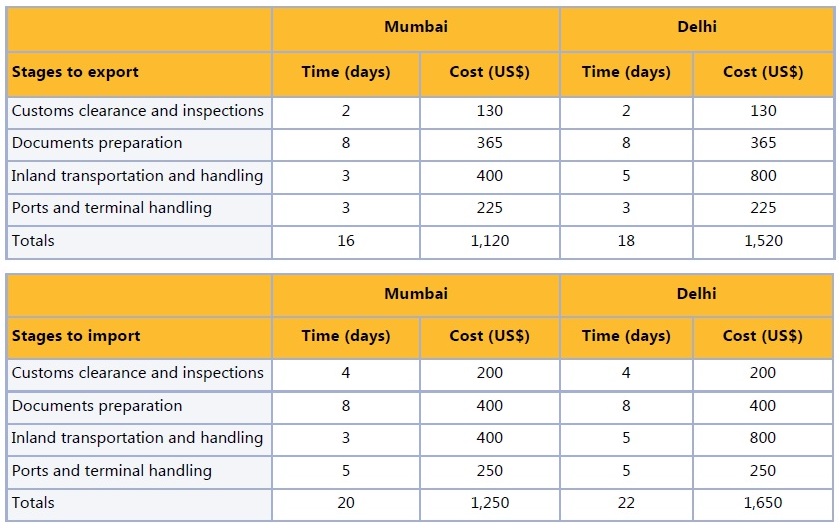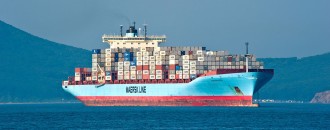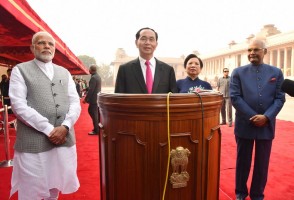
India slips 4 places to 126 in World Bank’s 2015 Foreign Trade rankings
Bidhu Bhushan Palo | @TheDollarBiz  India has slipped four points to the 126th rank in World Bank’s “Trading Across Borders” indicator in the 2015 Ease of Doing Business report released this week. Singapore, Hong Kong, and South Korea hold the top three spots respectively. Launched in 2002, the Doing Business (DB) is a World Bank project which aims to provide measures of business regulations (which includes foreign trade) and their enforcement across 189 economies at different levels. DB measures three broad parameters (documentation, time and cost per container) to rank countries in the “Trading Across Borders” indicator. It excludes tariffs, time and cost for sea transport associated with exporting and importing a standard shipment of goods by sea transport. According to available data from 2006, the number of policy documents required to export or import a standard container of goods from India hasn’t changed from 7 and 10 respectively in the last eight years. While the time to export or import has come down, overall trading costs have gone up significantly in India, which led to the downgrade. DB says that the time required to complete the export of an item from India has come down from 27 days in 2006 to 18 days in the year ending May 31, 2014, while the time required to complete imports has come down from 41 to 22 days in the same period. However, the figures are much higher than international benchmarks. According to DB, the number of documents required in Singapore to export or import is three each, while time to export and import are six days and three days respectively. At present, there are 7 export documents and 10 import documents to be filled and approved in India, which consume a significant part of the total time and trading costs. Export documents include: Bill of Lading, Commercial invoice, Foreign currency exchange form, Packing list, Shipping Bill (customs export declaration), Technical standard certificate, and Terminal handling receipts. Import documents include: Bill of Entry (customs import declaration), Bill of lading, Cargo release order, Certified engineer's report (No objection certificate), Commercial invoice, Inspection report, Packing list, Product manual, Technical standard certificate / No objection certificate, and Terminal handling receipts, according to DB. The average time it takes to export an item involves four main stages (Customs, Documentation, Inland transport, and Port handling) which take around 18 days in Delhi (16 in Mumbai), while the same for imports increases to 22 days in Delhi (20 in Mumbai). In both cases document preparation takes up the bulk of around 8 days.
India has slipped four points to the 126th rank in World Bank’s “Trading Across Borders” indicator in the 2015 Ease of Doing Business report released this week. Singapore, Hong Kong, and South Korea hold the top three spots respectively. Launched in 2002, the Doing Business (DB) is a World Bank project which aims to provide measures of business regulations (which includes foreign trade) and their enforcement across 189 economies at different levels. DB measures three broad parameters (documentation, time and cost per container) to rank countries in the “Trading Across Borders” indicator. It excludes tariffs, time and cost for sea transport associated with exporting and importing a standard shipment of goods by sea transport. According to available data from 2006, the number of policy documents required to export or import a standard container of goods from India hasn’t changed from 7 and 10 respectively in the last eight years. While the time to export or import has come down, overall trading costs have gone up significantly in India, which led to the downgrade. DB says that the time required to complete the export of an item from India has come down from 27 days in 2006 to 18 days in the year ending May 31, 2014, while the time required to complete imports has come down from 41 to 22 days in the same period. However, the figures are much higher than international benchmarks. According to DB, the number of documents required in Singapore to export or import is three each, while time to export and import are six days and three days respectively. At present, there are 7 export documents and 10 import documents to be filled and approved in India, which consume a significant part of the total time and trading costs. Export documents include: Bill of Lading, Commercial invoice, Foreign currency exchange form, Packing list, Shipping Bill (customs export declaration), Technical standard certificate, and Terminal handling receipts. Import documents include: Bill of Entry (customs import declaration), Bill of lading, Cargo release order, Certified engineer's report (No objection certificate), Commercial invoice, Inspection report, Packing list, Product manual, Technical standard certificate / No objection certificate, and Terminal handling receipts, according to DB. The average time it takes to export an item involves four main stages (Customs, Documentation, Inland transport, and Port handling) which take around 18 days in Delhi (16 in Mumbai), while the same for imports increases to 22 days in Delhi (20 in Mumbai). In both cases document preparation takes up the bulk of around 8 days.
 Source: Doing Business database October, 2015
Source: Doing Business database October, 2015The costs involved in completing imports are also higher than for exports, particularly for documentation. According to DB, documentation costs takes up around $365 for exports and $400 for imports. Inland transportation is also major cost, accounting for around 30-50% of total export and import costs in India. Overall, the cost to export an item now stands at around $1,520 per container, which is up around 87% from $814 per container in 2006, while the cost to import has increased to $1,650 per container, up about 25% from $1,324 per container in 2006. In comparison, the cost to export in Singapore stands at around $460 per container (up around 10% from $416 in 2006), while the cost to import stands at around $440 per container (up about 20% from $367 in 2006), DB says. DB adds that making trade between economies easier is increasingly important for businesses, particularly for those in developing countries. It adds, “Research shows that exporters in developing countries gain more from a 10% drop in their trading costs than from a similar reduction in the tariffs applied to their products in global markets.”
 Source: Doing Business database
Source: Doing Business databaseIndia has also slipped down to the 142 rank in the overall 2015 Ease of Doing Business rankings. DB says that while India has improved on some parameters such as reduction of registration fees, it has also made it more difficult by introducing a requirement to file a declaration before the commencement of business operations. The World Bank says that electronic systems are getting increasingly popular across the world and can play a crucial role in making business easier by reducing time, effort, and corruption. “Where entrepreneurs have no need to interact directly with public officials, they are less likely to use informal payments or to face deliberate delays aimed at encouraging bribes,” it says. Reacting to the new DB rankings for India, Dr. A. Didar Singh, Secretary General, Federation of Indian Chambers of Commerce and Industry (FICCI), said, "It is disappointing to see India's slippage in the ranking, given the fact that a lot of serious measures for ease of doing business have been taken and are being taken by Government." He added that it is hoped India will improve its ranking in the year ending May 31, 2015. "There is a lot of scope to rationalise and simplify our regulations for business and to make India a more attractive destination for manufacturing and doing business,” Singh said.
This article was published on October 31, 2014.






 to success.
to success.